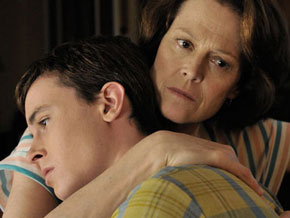You, dear reader, have probably seen a story very similar to this happen or be told by your neighbor, cousin or co-worker, or even the situation may have affected you: a boy reveals his homosexuality to his parents and siblings and suffers the prejudice and pressure from the family, mainly due to the fact that family members faithfully follow the Church's manual and the teachings of a "distorted Holy Bible": the film of the moment is Prayers for Bobby, released on television in the United States the day before the Oscar ceremony 2009. Exciting, the film captivates the viewer by working well with the main and supporting characters. Controversial, as it stereotypes the homosexual universe in a few, but significant, passages.
The film is based on the book of the same name by Leroy F Aarons, produced for television. Russell Mulcahy directs this plot about Mary (Sigourney Weaver, great), a devout Christian, who follows all the dictates of the Church she attends and biblical teachings. One day, she has to face the facts: one of her sons is homosexual, the delicate Bobby (Ryan Kelley). From then on, Mary begins an incessant crusade seeking a cure for her son, undergoing intense religious rites and therapies.

After a while of trying to accept the situation and survive the pressure he was under, Bobby has a crisis of despair and decides to take his life by throwing himself off a bridge. Mary, shocked by the news, goes into a state of shock and begins to rethink her actions, seeking the answers she needed to deal with the situation in another nearby church, especially after finding her son's diary and, upon reading it, realizing that if it was about a still immature life of suffering and full of indecision and fear.
Bobby not only faced his mother's prejudice. His grandmother, right at the beginning of the plot, during a birthday party, becomes exasperated when she sees one of her grandchildren, Bobby's brother, playing and cross-dressing, making fun of one of her gifts. Taxingly, she says: “the queers should be lined up and shot!” Bobby is part of a family strongly influenced by the dictates of controversial interpretations that churchgoers make of the text written and interpreted by men: the Bible. Even at the dinner table they debate concepts and rules from the holy book.

The film also portrays Bobby's attempts to fit in: in his parents' car, during a torrid encounter (only on her part) with his school sweetheart, he escapes the situation by being placed in the wall by the girl, who at the moment, wants to have sex. with the boy. He ends the relationship and tells his older brother the next day, who isn't excited about keeping it a secret and reveals everything to his mother, so that something can be done in time.
All the dramas we've seen in other films or in our lives: the tension when seeing a gay kiss or scene on television, close to family members and their infamous comments; going to the therapist and the incessant search for a cure on the part of some parents; the aunt or godmother who asks her nephew to take his hand off his waist, so as not to look like a woman; the intense plunge of the first passionate kiss; the feeling of freedom in sleeping with another guy; the liberal and relaxed cousin, free from prejudice, who helps the character with the heavy load that Bobby faces in his home. Situations already known to the target audience, offered in Prayers for Bobby.
Another interesting point of the film is the sensitivity of the character Bobby: while his mother watches one of Hitchcock's classics, Bobby sits next to her and begins to comment on the film, specific details of cinema language and curiosities. Of all four children, Bobby is the one who is most sensitive to artistic expressions. Stereotype? Perhaps. But at least portrayed in a positive light.
For those accustomed to the style of cinematographic language conveyed in large productions, Prayers for Bobby It can be annoying due to the rhythm and editing typical of soap operas. But, on the other hand, the performances are as remarkable as those we are used to seeing compete for Oscars and BAFTAs every year.
The film competed for the main awards linked to television productions: Golden Globe, SAG Awards and Emmy: if it were directed to cinemas, without a shadow of a doubt it would compete for the Oscar for Best Actress, such is the greatness of the performance by the excellent Sigourney Weaver. The character is carefully crafted: we have an idea of her behavior at work and with her professional colleagues, at church and at home.
With safe direction, cohesive script, Prayers for Bobby it only bothers a little by linking the gay ghettos with “the fall into the hole” suffered by Bobby, in the style of Alice, from Lewis Carroll's classic, full of enigmatic figures and reinforcement of the apparent previous lives of homosexuals. It is in a nightclub that Bobby will meet his first love. Would it be on purpose? Why not value another side of gays, in a meeting outside the club circuit and empty entertainment, such as at a book launch or a cultural music or cinema session? It's just a detail that, in my point of view, would break common ground, especially among mothers, the film's target audience, who are afraid of the so-called “dirty” lives of some homosexuals.
Another problem is Bobby's confused view of his boyfriend David. After arguing with his mother, Bobby leaves the house in tears, hurt by the statement “I don’t want to have a gay son, get out of my house!”, recited by the mother. While driving towards her cousin's house, and consequently meeting her boyfriend, she passes by a gay nightclub and finds him kissing another boy. From there, she heads to a bridge and commits suicide. We realized that not only through the mother's words, but finding her boyfriend cheating on him also added to the act of killing herself. Hence, the question: why convey the stereotype of betrayal towards homosexuals? We know that this is another common myth in people's daily lives. Gay men don't get attached to anything and cheat on their boyfriends more easily. Here's the question: I leave it, by the way, open for readers to make their comments.

Later on, Mary looks for the best way to redeem herself. She begins attending meetings of parents of homosexuals at a church near her home and eventually becomes something of a gay rights activist. It is worth noting that this does not happen overnight. Thanks to the ellipsis, we are taken forward in the narrative and six months later, Mary still has some prejudices within her, which are broken throughout the film. The awareness is not artificial and the film addresses the situation very well. With caution, Mary and her family work on the idea that the Bible does not preach hatred of homosexuals. In an interesting scene, Mary seeks out the pastor to clarify some doubts: he informs, for example, that the word abominable in that period referred to unhygienic and that the passage from Leviticus, the third book of the Bible, which says that a man who lies with another requires interpretation, as do other passages from the Bible that are cited in the dialogue.
Prayers for Bobby was launched by the Lifetime channel, considered the housewives' channel. Soon after, it became one of those internet phenomena, broadcast by megaupload and torrent, subtitled in the most diverse languages and shared on blogs and download sites, aimed mainly at the homosexual public. The release of the film on DVD has not yet been mentioned in Brazil, as has the publication in Portuguese of the book of the same name that gave rise to the film. Don't forget to see Prayers for Bobby: it is a film full of positive points and with an excellent discussion about gay culture.
"Prayers for Bobby" – rating 8 – available on the Gay Load Portal; not on DVD
*Leonardo Campos writes biweekly in this space about cinema and DVD releases. He is a researcher in cinema, literature and culture at the Federal University of Bahia (UFBA) and professor of literature.



